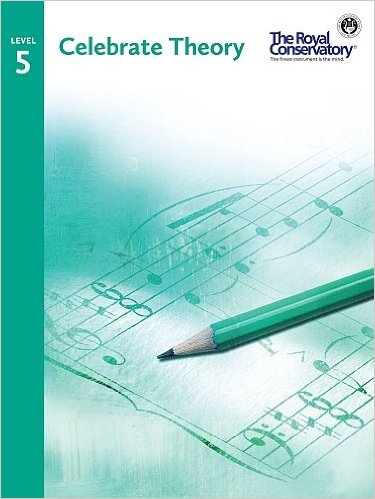 I’m so excited to tell you today about a fantastic series of theory workbooks called Celebrate Theory (Canada | U.S.), just released from Frederick Harris Music publishers. If you happen to already enjoy – as I do – using the wonderful Celebration Series (Canada | U.S. | Amazon.com) with your piano students, you will be especially interested in learning about Celebrate Theory.
I’m so excited to tell you today about a fantastic series of theory workbooks called Celebrate Theory (Canada | U.S.), just released from Frederick Harris Music publishers. If you happen to already enjoy – as I do – using the wonderful Celebration Series (Canada | U.S. | Amazon.com) with your piano students, you will be especially interested in learning about Celebrate Theory.
Before talking about the specifics of the Celebrate Theory books, allow me to first briefly cover some background information about The Royal Conservatory and the revisions to the RCM Theory Syllabus, 2016 Edition.
The Royal Conservatory (RCM) is a music education institution in Toronto that has been in existence since 1886 and is responsible for a curriculum for music study that is considered by many to be the foremost music education system in Canada, the United States, and many other countries around the world. Exam centers for RCM (also known as the Music Development Program [MDP] in the U.S.) are available in many major cities a few times each year. RCM offers quality publications for music study through their non-profit publisher, Frederick Harris Music.
I have entered a few students in the RCM/MDP practical exams over the past few years and I consider the program to be absolutely top notch. (Check out my printable charts for helping students prepare for the technical requirements portion of the assessment.)
Whether or not your students participate in RCM/MDP exams, you will find the Celebrate Theory books worth your attention.
The new Celebrate Theory books are offered from Preparatory to Level 8, coinciding with the repertoire and etudes books from the Celebration Series. At Levels 9, 10, and ARCT, there are Harmony & Counterpoint and Analysis books available soon (Spring 2017), as well as History books (Winter 2016/17).
The new books coincide with the changes (historically made every seven years) to the RCM Theory Syllabus, 2016 Edition (you can view the PDF here, or order a hardcopy: Canada | U.S.). Previously, the RCM theory exams consisted of Basic Rudiments, Intermediate Rudiments, Advanced Rudiments exams. Beginning with the new 2016 syllabus, the exams are now offered at every level from Level 5 through Level 8. The Preparatory through Level 4 books are available to help aid the student towards success on the first written exam. This expansion of the theory exams is intended to encourage theory study at every level and support the development of well-rounded musicianship.
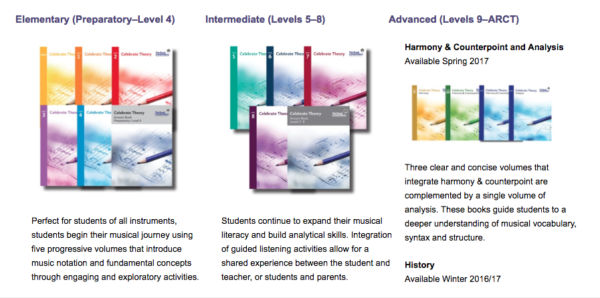
I am absolutely thrilled to have another option for top-quality theory workbooks to use with my students. Let’s take a look at the insides of the books.
Below is a tiny peek at pages from the Preparatory book and Level 1. The layout on the page is clean and pleasing to the eye. The way the books introduce new concepts is impeccably clear. I’m impressed with the thoughtfulness behind and the effectiveness of the written exercises for the student.
This isn’t the kind of theory book that teaches mistruths that must be corrected later as the student advances (for example: “A quarter note always equals one beat”, which isn’t true in time signatures such as 6/8). The concepts are taught correctly and thoroughly.
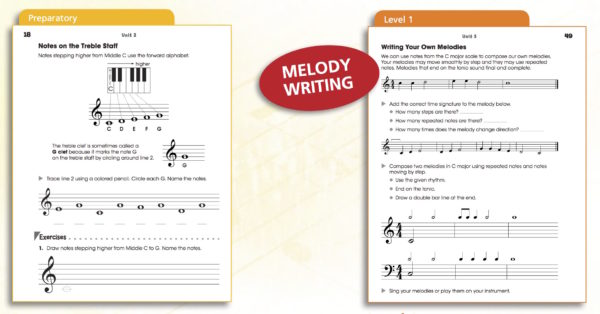
Throughout the series, the book methodically includes music appreciation, exploration of repertoire, melody writing, and more. The series is thorough and comprehensive enough to serve as a curriculum leading towards college-level theory studies.
Here is a tiny peek at the inside of Level 5 and Level 6. At this point, students are learning triad inversions, dominant 7th chords, compound meter, augmented and diminished intervals, half and authentic cadences, and analysis of repertoire.
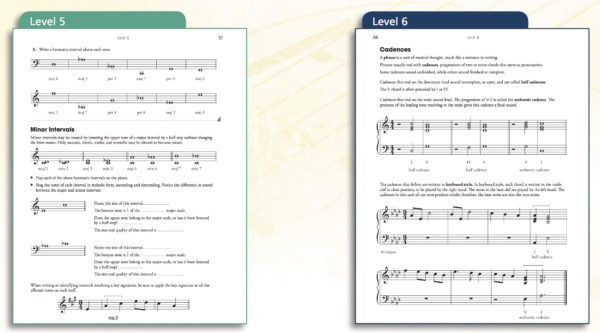
Click here to view the PDF sampler exploring the whole series. If you are interested in learning particularly about the changes from the previous theory syllabus to the 2016 edition, check out these PDF presentation slides from the RCM Theory/Celebrate Theory Workshop.
Bottom line: The new Celebrate Theory books are quite possibly the best music theory workbook series on the market. The books aren’t inexpensive, unfortunately; but they are lengthy (70+ pages) and the quality of instruction is top notch. The Celebrate Theory is joining my personal top go-to theory workbooks for my piano students (my other big favorite being Keith Snell’s Fundamentals of Piano Theory).
Check out the Celebrate Theory books on the RCM website (Canada | U.S.) or on Amazon here.
Disclaimer: I received a set of the Celebrate Theory series in exchange for my review.


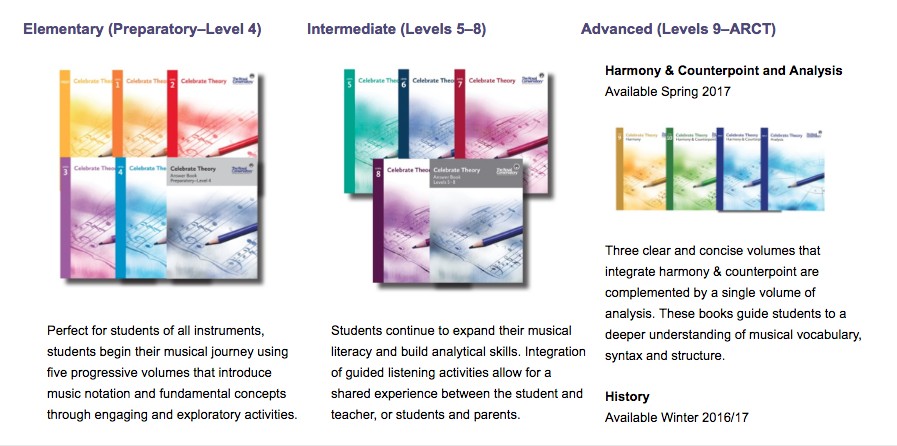
Hi Joy,
I totally agree with you… I love the RCM and Musical Development Program. I have been teaching with this curriculum for more than 15 years. I was very excited in August at the teacher’s summit in Toronto when they launched the theory syllabus. Also, I love how they standardized the program so it can be used in the US.
I love your writing and explanation of everything AND the slide presentation. I wouldn’t have put it any other way!
Keep up the good work!
Thanks so much, Susy! I’m glad we can share our enthusiasm for RCM/MDP. 🙂
Hi Joy! Would you only use these theory books with your advanced students? I find that the “mistruths” part of theory books for the younger kids is necessary, but for more advanced and older students, these Celebration Series theory books would probably work well. 🙂
I have very much enjoyed the RCM Books. I have a few of the 2003 series, a few of the 2008 series, and am now thinking of building my 2015 collection. (I never got all 10 levels as I would only by the levels needed for the students I had at the time.) I have been dismayed to see that this new series does not have the student workbooks. Have they kept the music history and analysis component in some other form, perhaps in the repertoire books themselves?
I am also curious about this. I hope this is the case, since imo the workbooks were what made this such a great series. I have heard an unfortunate rumour however that the workbooks are now some thing only available to teachers who choose to become “certified” – which basically involves paying for a costly subscription. Hopefully this isnt not true, but if it is , I won’t be using this series anymore. Yes, they are great books, but their books are already more expensive than many students can afford. Their higher level repertoire books are over $40! It just seems more and more like a money grab.
As I understand it, the music history exams have been re-structured and new resources corresponding to those exams are becoming available. Any “analysis” component would be covered by both the new theory books and the new history resources, I imagine!